Comparative Analysis of IFRS Adoption in Australia and India: A Report
VerifiedAdded on 2022/08/21
|21
|3119
|11
Report
AI Summary
This report provides a comprehensive analysis of IFRS adoption in Australia and India, focusing on the relevance of Positive Accounting Theory (PAT) in predicting accounting policy choices. It explores the efficiency and opportunistic perspectives of PAT. The report details the adoption of IFRS in both countries, including the transition process, transitional issues, and challenges faced by reporting entities. It also examines the benefits of IFRS adoption for both countries, highlighting the similarities and differences in their approaches. The analysis covers the success of IFRS adoption, recommendations for national accounting setting bodies, and concludes by emphasizing the impact of IFRS on financial statements and economic efficiency.

ACCOUNTING THEORY &
CONTEMPORARY ISSUES
CONTEMPORARY ISSUES
Paraphrase This Document
Need a fresh take? Get an instant paraphrase of this document with our AI Paraphraser
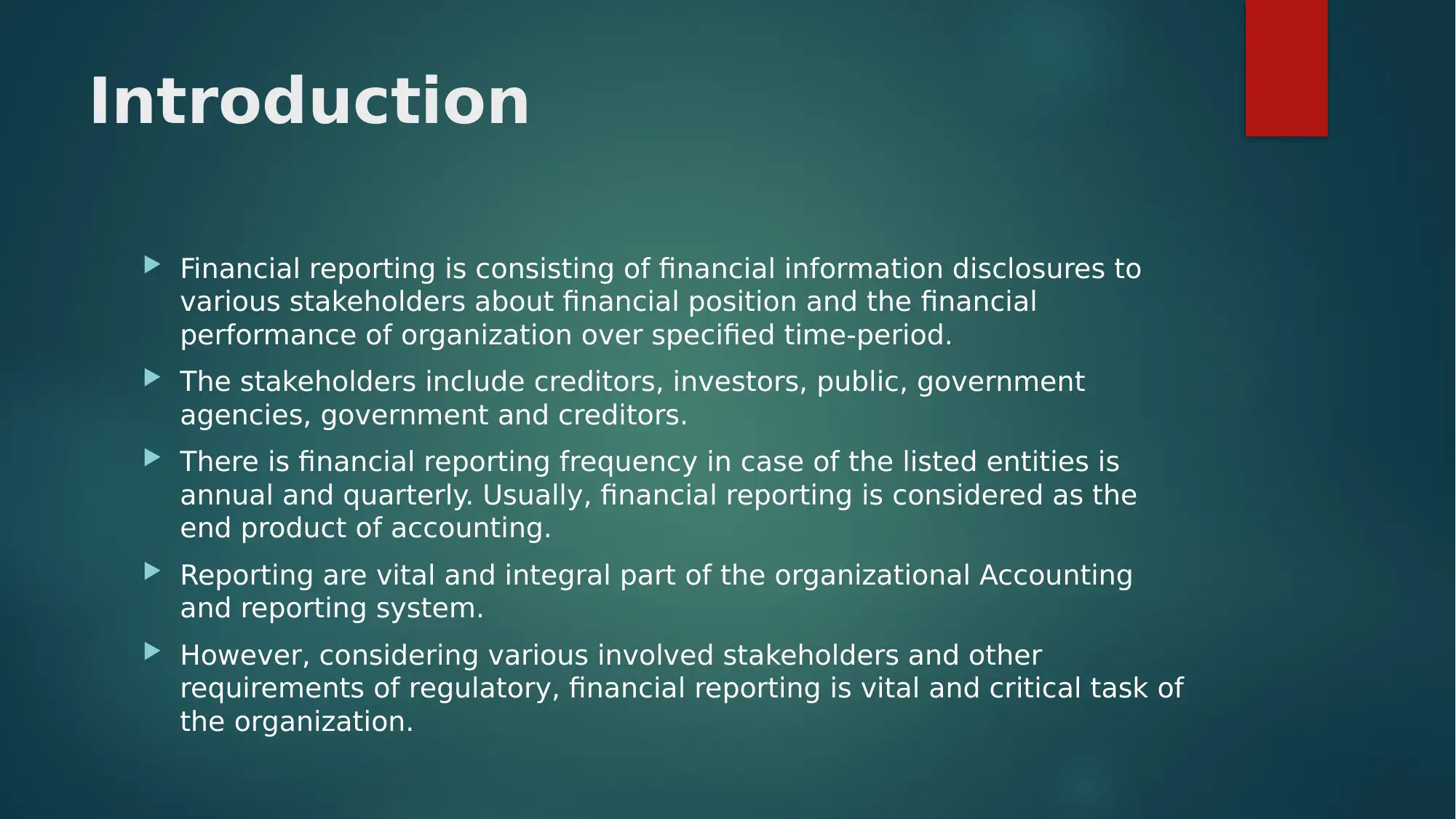
Introduction
Financial reporting is consisting of financial information disclosures to
various stakeholders about financial position and the financial
performance of organization over specified time-period.
The stakeholders include creditors, investors, public, government
agencies, government and creditors.
There is financial reporting frequency in case of the listed entities is
annual and quarterly. Usually, financial reporting is considered as the
end product of accounting.
Reporting are vital and integral part of the organizational Accounting
and reporting system.
However, considering various involved stakeholders and other
requirements of regulatory, financial reporting is vital and critical task of
the organization.
Financial reporting is consisting of financial information disclosures to
various stakeholders about financial position and the financial
performance of organization over specified time-period.
The stakeholders include creditors, investors, public, government
agencies, government and creditors.
There is financial reporting frequency in case of the listed entities is
annual and quarterly. Usually, financial reporting is considered as the
end product of accounting.
Reporting are vital and integral part of the organizational Accounting
and reporting system.
However, considering various involved stakeholders and other
requirements of regulatory, financial reporting is vital and critical task of
the organization.
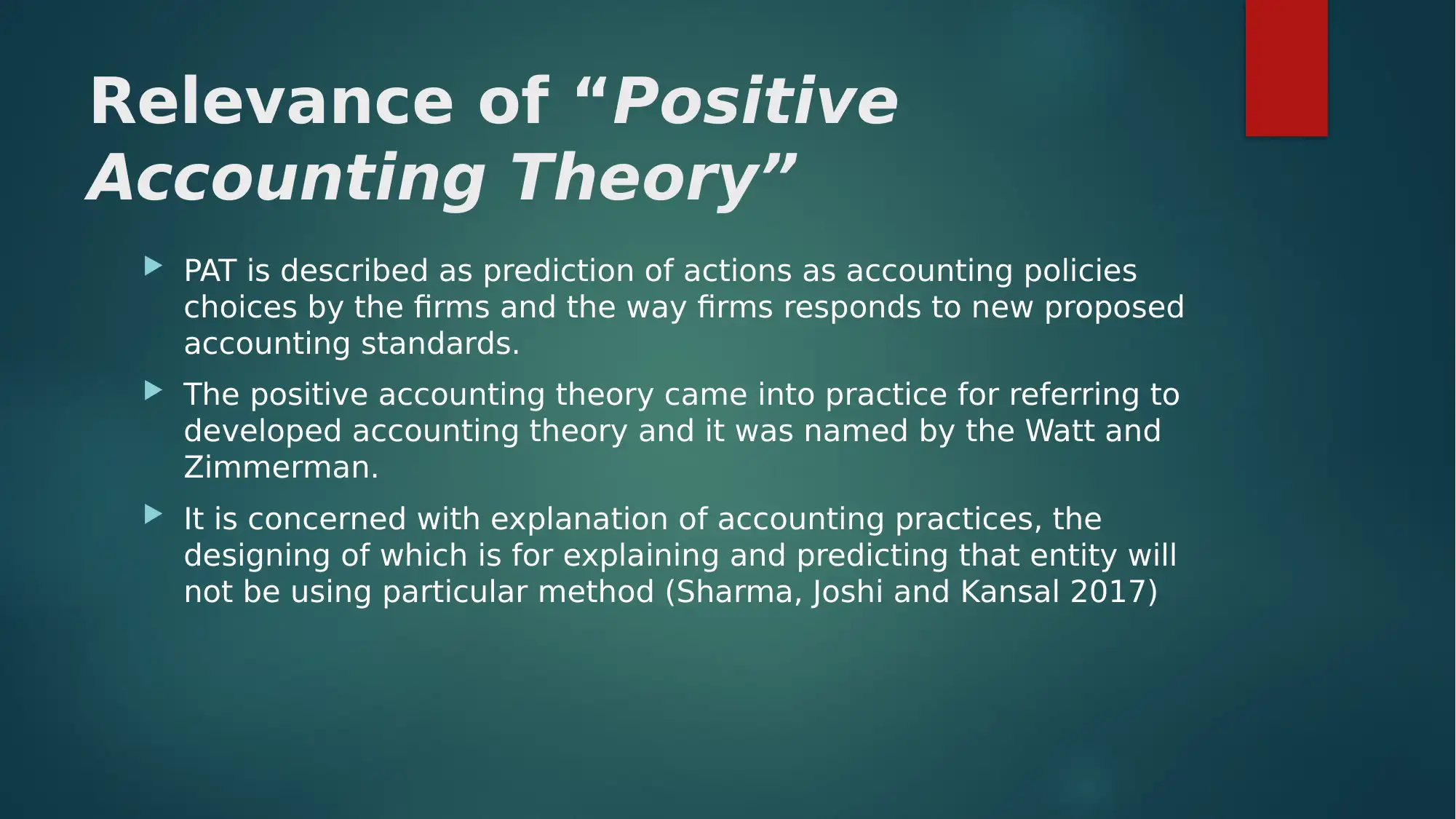
Relevance of “Positive
Accounting Theory”
PAT is described as prediction of actions as accounting policies
choices by the firms and the way firms responds to new proposed
accounting standards.
The positive accounting theory came into practice for referring to
developed accounting theory and it was named by the Watt and
Zimmerman.
It is concerned with explanation of accounting practices, the
designing of which is for explaining and predicting that entity will
not be using particular method (Sharma, Joshi and Kansal 2017)
Accounting Theory”
PAT is described as prediction of actions as accounting policies
choices by the firms and the way firms responds to new proposed
accounting standards.
The positive accounting theory came into practice for referring to
developed accounting theory and it was named by the Watt and
Zimmerman.
It is concerned with explanation of accounting practices, the
designing of which is for explaining and predicting that entity will
not be using particular method (Sharma, Joshi and Kansal 2017)
⊘ This is a preview!⊘
Do you want full access?
Subscribe today to unlock all pages.

Trusted by 1+ million students worldwide
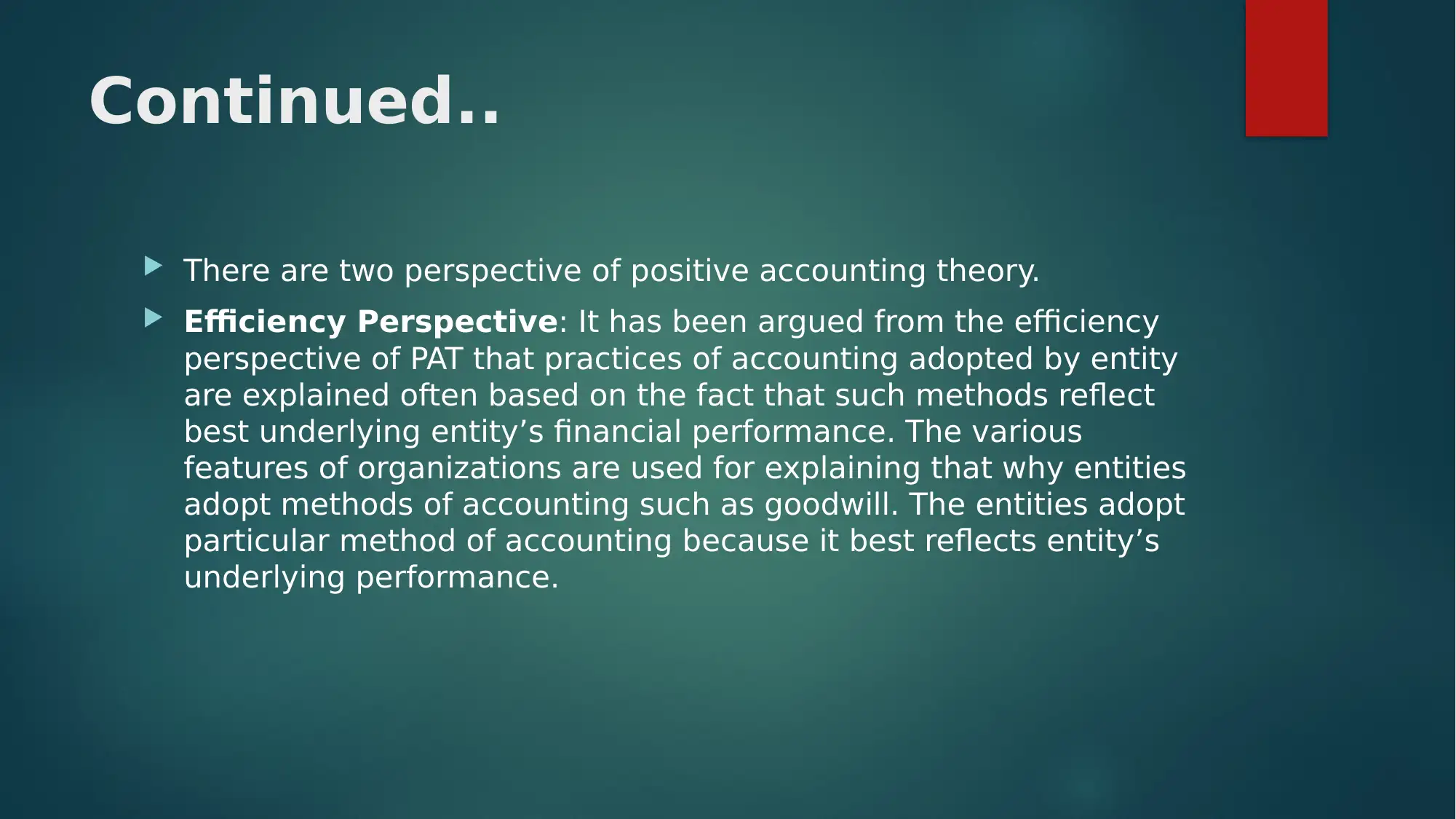
Continued..
There are two perspective of positive accounting theory.
Efficiency Perspective: It has been argued from the efficiency
perspective of PAT that practices of accounting adopted by entity
are explained often based on the fact that such methods reflect
best underlying entity’s financial performance. The various
features of organizations are used for explaining that why entities
adopt methods of accounting such as goodwill. The entities adopt
particular method of accounting because it best reflects entity’s
underlying performance.
There are two perspective of positive accounting theory.
Efficiency Perspective: It has been argued from the efficiency
perspective of PAT that practices of accounting adopted by entity
are explained often based on the fact that such methods reflect
best underlying entity’s financial performance. The various
features of organizations are used for explaining that why entities
adopt methods of accounting such as goodwill. The entities adopt
particular method of accounting because it best reflects entity’s
underlying performance.
Paraphrase This Document
Need a fresh take? Get an instant paraphrase of this document with our AI Paraphraser

Continued..
Opportunistic Perspective: This perspective of positive
accounting theory takes the consideration regarding firm’s
negotiated contractual arrangement and seeks for predicting and
explaining certain opportunistic behavior, which will occur
subsequently.
Opportunistic Perspective: This perspective of positive
accounting theory takes the consideration regarding firm’s
negotiated contractual arrangement and seeks for predicting and
explaining certain opportunistic behavior, which will occur
subsequently.
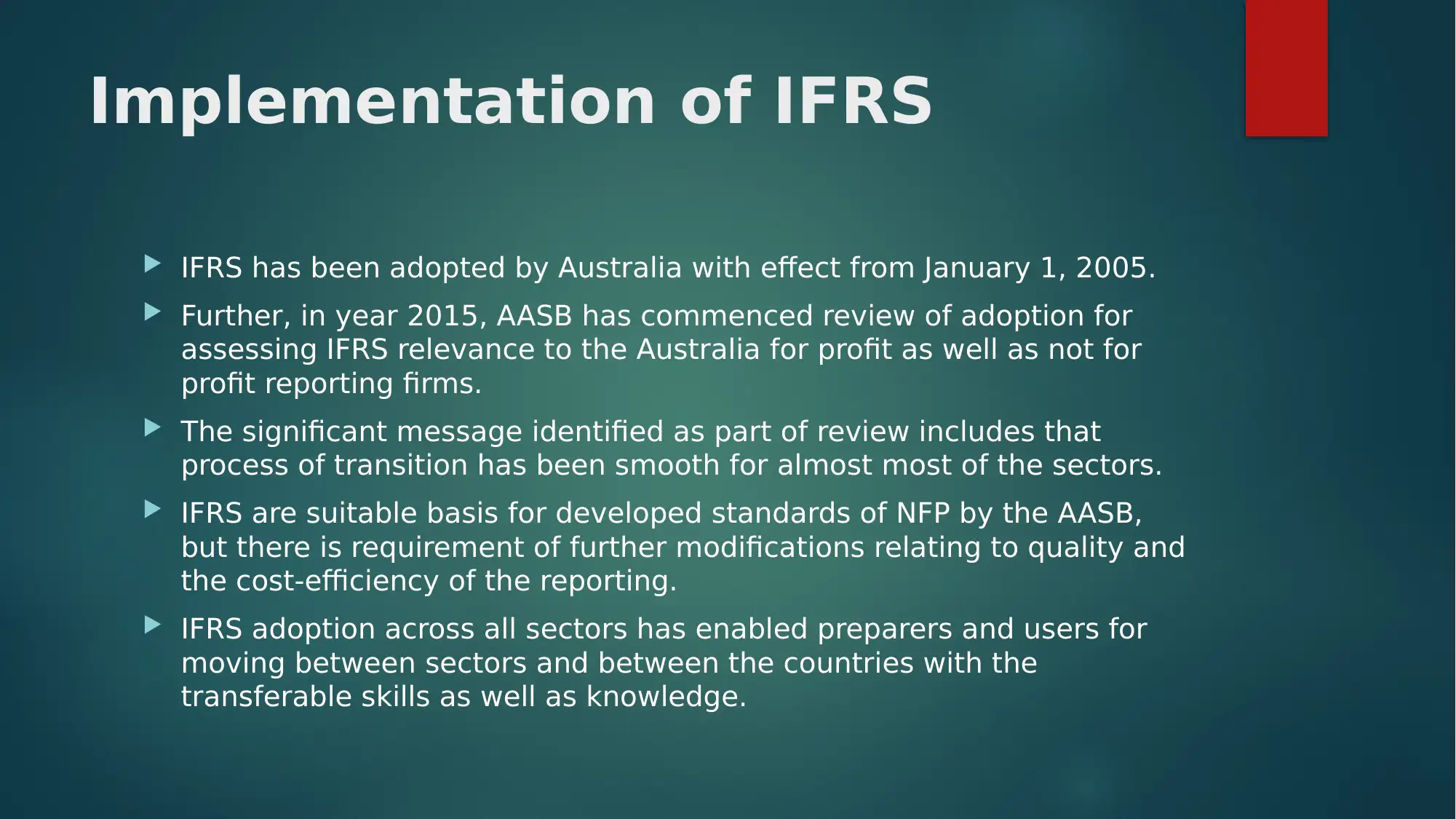
Implementation of IFRS
IFRS has been adopted by Australia with effect from January 1, 2005.
Further, in year 2015, AASB has commenced review of adoption for
assessing IFRS relevance to the Australia for profit as well as not for
profit reporting firms.
The significant message identified as part of review includes that
process of transition has been smooth for almost most of the sectors.
IFRS are suitable basis for developed standards of NFP by the AASB,
but there is requirement of further modifications relating to quality and
the cost-efficiency of the reporting.
IFRS adoption across all sectors has enabled preparers and users for
moving between sectors and between the countries with the
transferable skills as well as knowledge.
IFRS has been adopted by Australia with effect from January 1, 2005.
Further, in year 2015, AASB has commenced review of adoption for
assessing IFRS relevance to the Australia for profit as well as not for
profit reporting firms.
The significant message identified as part of review includes that
process of transition has been smooth for almost most of the sectors.
IFRS are suitable basis for developed standards of NFP by the AASB,
but there is requirement of further modifications relating to quality and
the cost-efficiency of the reporting.
IFRS adoption across all sectors has enabled preparers and users for
moving between sectors and between the countries with the
transferable skills as well as knowledge.
⊘ This is a preview!⊘
Do you want full access?
Subscribe today to unlock all pages.

Trusted by 1+ million students worldwide
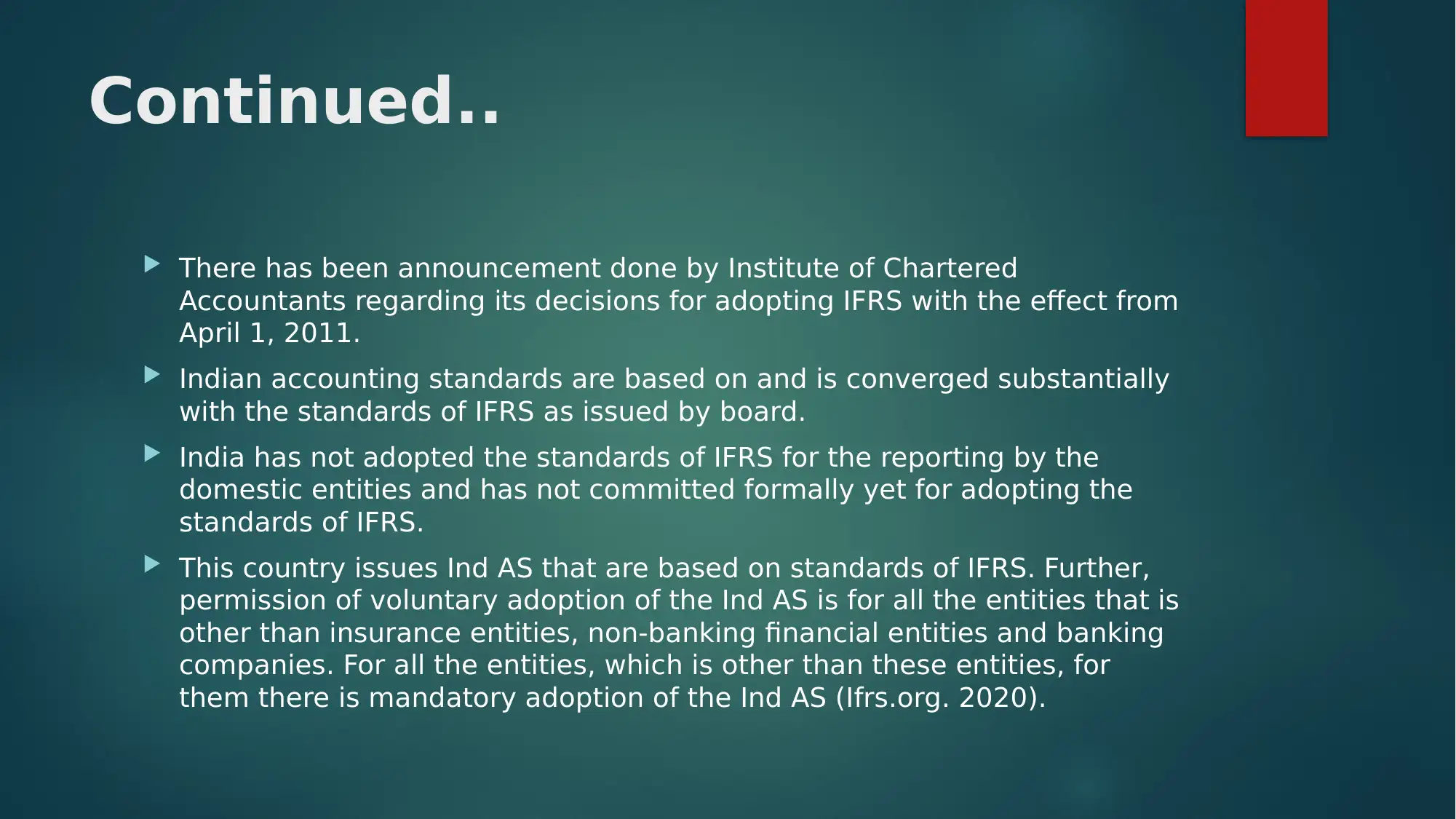
Continued..
There has been announcement done by Institute of Chartered
Accountants regarding its decisions for adopting IFRS with the effect from
April 1, 2011.
Indian accounting standards are based on and is converged substantially
with the standards of IFRS as issued by board.
India has not adopted the standards of IFRS for the reporting by the
domestic entities and has not committed formally yet for adopting the
standards of IFRS.
This country issues Ind AS that are based on standards of IFRS. Further,
permission of voluntary adoption of the Ind AS is for all the entities that is
other than insurance entities, non-banking financial entities and banking
companies. For all the entities, which is other than these entities, for
them there is mandatory adoption of the Ind AS (Ifrs.org. 2020).
There has been announcement done by Institute of Chartered
Accountants regarding its decisions for adopting IFRS with the effect from
April 1, 2011.
Indian accounting standards are based on and is converged substantially
with the standards of IFRS as issued by board.
India has not adopted the standards of IFRS for the reporting by the
domestic entities and has not committed formally yet for adopting the
standards of IFRS.
This country issues Ind AS that are based on standards of IFRS. Further,
permission of voluntary adoption of the Ind AS is for all the entities that is
other than insurance entities, non-banking financial entities and banking
companies. For all the entities, which is other than these entities, for
them there is mandatory adoption of the Ind AS (Ifrs.org. 2020).
Paraphrase This Document
Need a fresh take? Get an instant paraphrase of this document with our AI Paraphraser
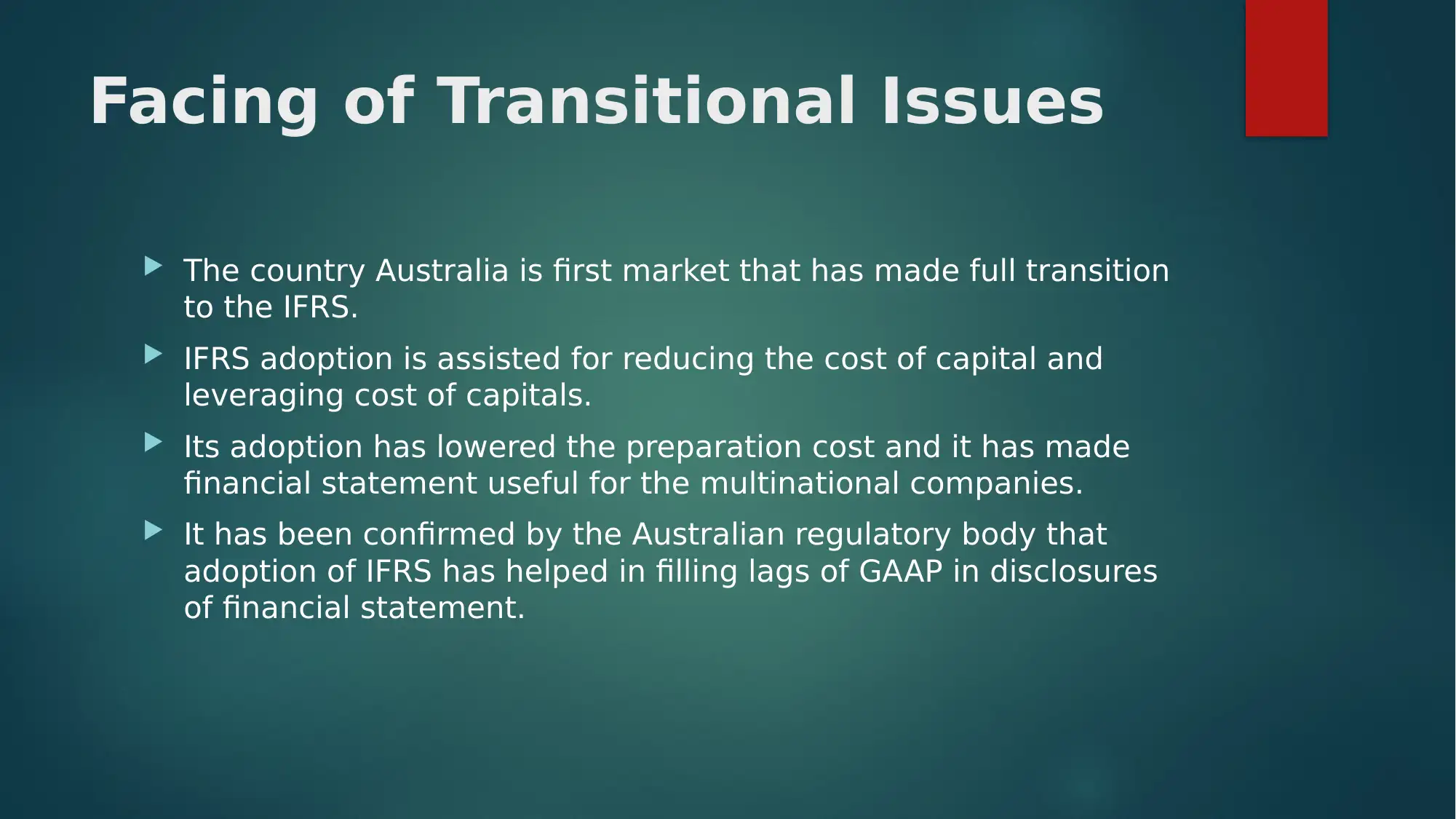
Facing of Transitional Issues
The country Australia is first market that has made full transition
to the IFRS.
IFRS adoption is assisted for reducing the cost of capital and
leveraging cost of capitals.
Its adoption has lowered the preparation cost and it has made
financial statement useful for the multinational companies.
It has been confirmed by the Australian regulatory body that
adoption of IFRS has helped in filling lags of GAAP in disclosures
of financial statement.
The country Australia is first market that has made full transition
to the IFRS.
IFRS adoption is assisted for reducing the cost of capital and
leveraging cost of capitals.
Its adoption has lowered the preparation cost and it has made
financial statement useful for the multinational companies.
It has been confirmed by the Australian regulatory body that
adoption of IFRS has helped in filling lags of GAAP in disclosures
of financial statement.
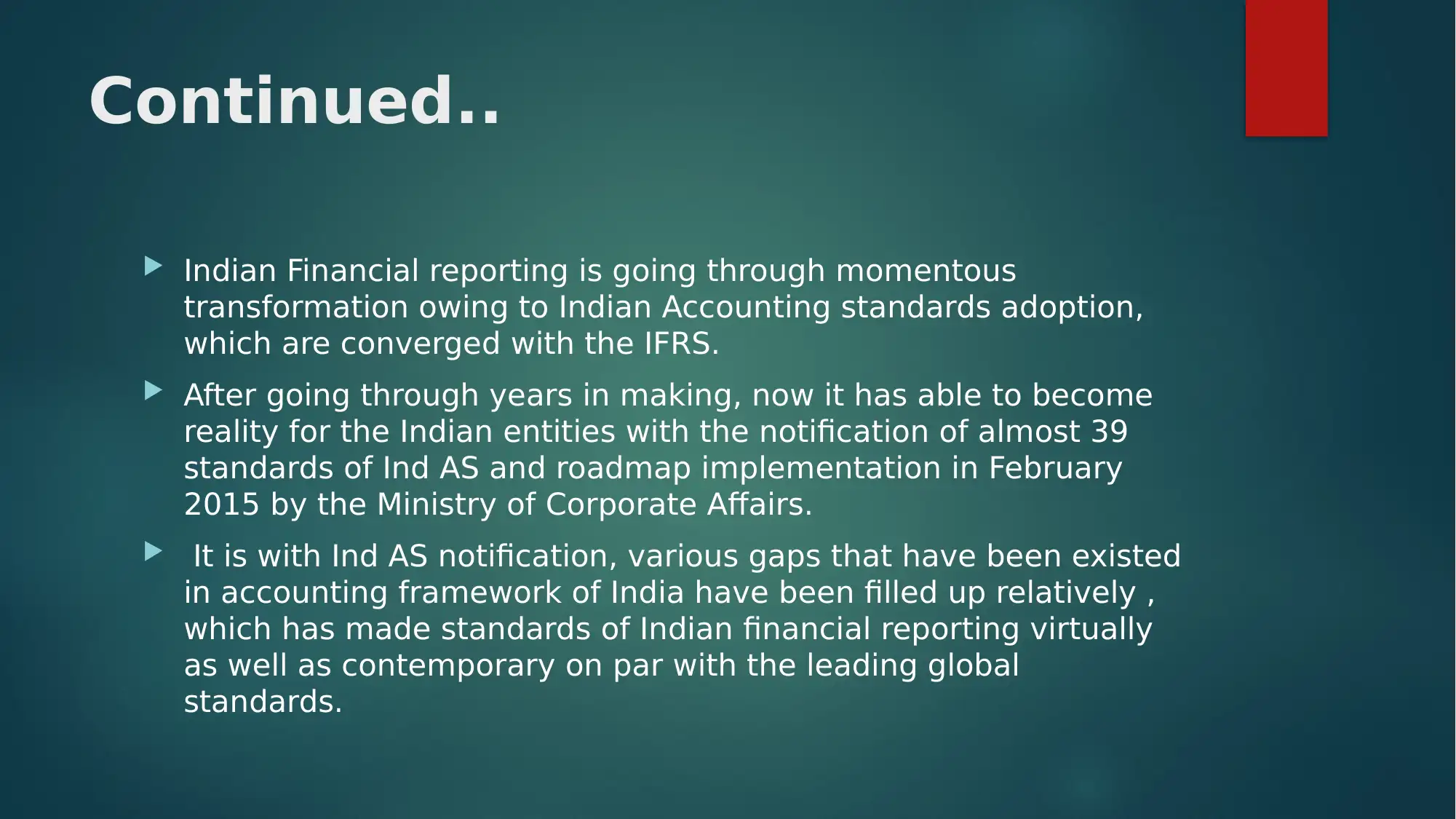
Continued..
Indian Financial reporting is going through momentous
transformation owing to Indian Accounting standards adoption,
which are converged with the IFRS.
After going through years in making, now it has able to become
reality for the Indian entities with the notification of almost 39
standards of Ind AS and roadmap implementation in February
2015 by the Ministry of Corporate Affairs.
It is with Ind AS notification, various gaps that have been existed
in accounting framework of India have been filled up relatively ,
which has made standards of Indian financial reporting virtually
as well as contemporary on par with the leading global
standards.
Indian Financial reporting is going through momentous
transformation owing to Indian Accounting standards adoption,
which are converged with the IFRS.
After going through years in making, now it has able to become
reality for the Indian entities with the notification of almost 39
standards of Ind AS and roadmap implementation in February
2015 by the Ministry of Corporate Affairs.
It is with Ind AS notification, various gaps that have been existed
in accounting framework of India have been filled up relatively ,
which has made standards of Indian financial reporting virtually
as well as contemporary on par with the leading global
standards.
⊘ This is a preview!⊘
Do you want full access?
Subscribe today to unlock all pages.

Trusted by 1+ million students worldwide
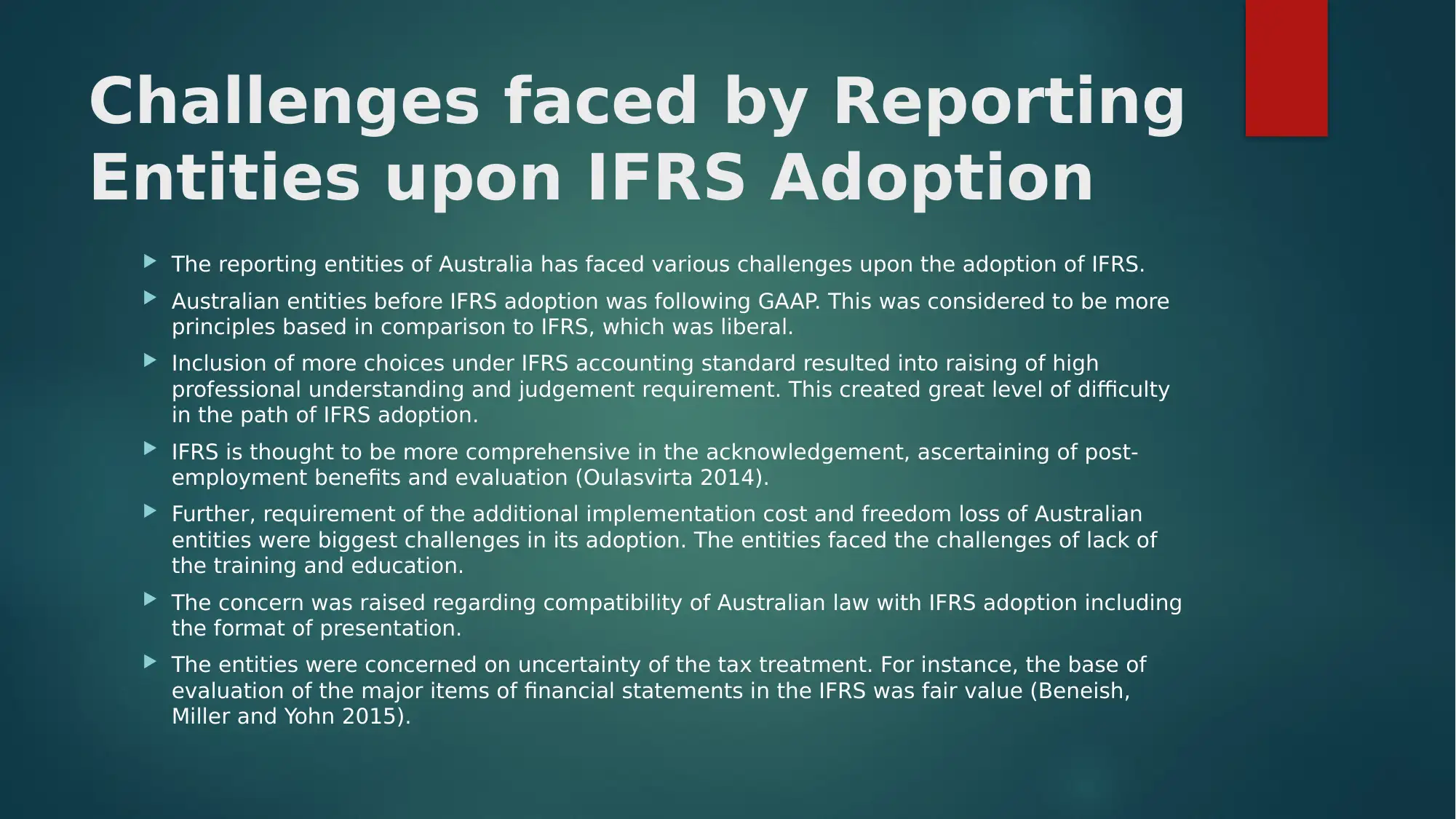
Challenges faced by Reporting
Entities upon IFRS Adoption
The reporting entities of Australia has faced various challenges upon the adoption of IFRS.
Australian entities before IFRS adoption was following GAAP. This was considered to be more
principles based in comparison to IFRS, which was liberal.
Inclusion of more choices under IFRS accounting standard resulted into raising of high
professional understanding and judgement requirement. This created great level of difficulty
in the path of IFRS adoption.
IFRS is thought to be more comprehensive in the acknowledgement, ascertaining of post-
employment benefits and evaluation (Oulasvirta 2014).
Further, requirement of the additional implementation cost and freedom loss of Australian
entities were biggest challenges in its adoption. The entities faced the challenges of lack of
the training and education.
The concern was raised regarding compatibility of Australian law with IFRS adoption including
the format of presentation.
The entities were concerned on uncertainty of the tax treatment. For instance, the base of
evaluation of the major items of financial statements in the IFRS was fair value (Beneish,
Miller and Yohn 2015).
Entities upon IFRS Adoption
The reporting entities of Australia has faced various challenges upon the adoption of IFRS.
Australian entities before IFRS adoption was following GAAP. This was considered to be more
principles based in comparison to IFRS, which was liberal.
Inclusion of more choices under IFRS accounting standard resulted into raising of high
professional understanding and judgement requirement. This created great level of difficulty
in the path of IFRS adoption.
IFRS is thought to be more comprehensive in the acknowledgement, ascertaining of post-
employment benefits and evaluation (Oulasvirta 2014).
Further, requirement of the additional implementation cost and freedom loss of Australian
entities were biggest challenges in its adoption. The entities faced the challenges of lack of
the training and education.
The concern was raised regarding compatibility of Australian law with IFRS adoption including
the format of presentation.
The entities were concerned on uncertainty of the tax treatment. For instance, the base of
evaluation of the major items of financial statements in the IFRS was fair value (Beneish,
Miller and Yohn 2015).
Paraphrase This Document
Need a fresh take? Get an instant paraphrase of this document with our AI Paraphraser
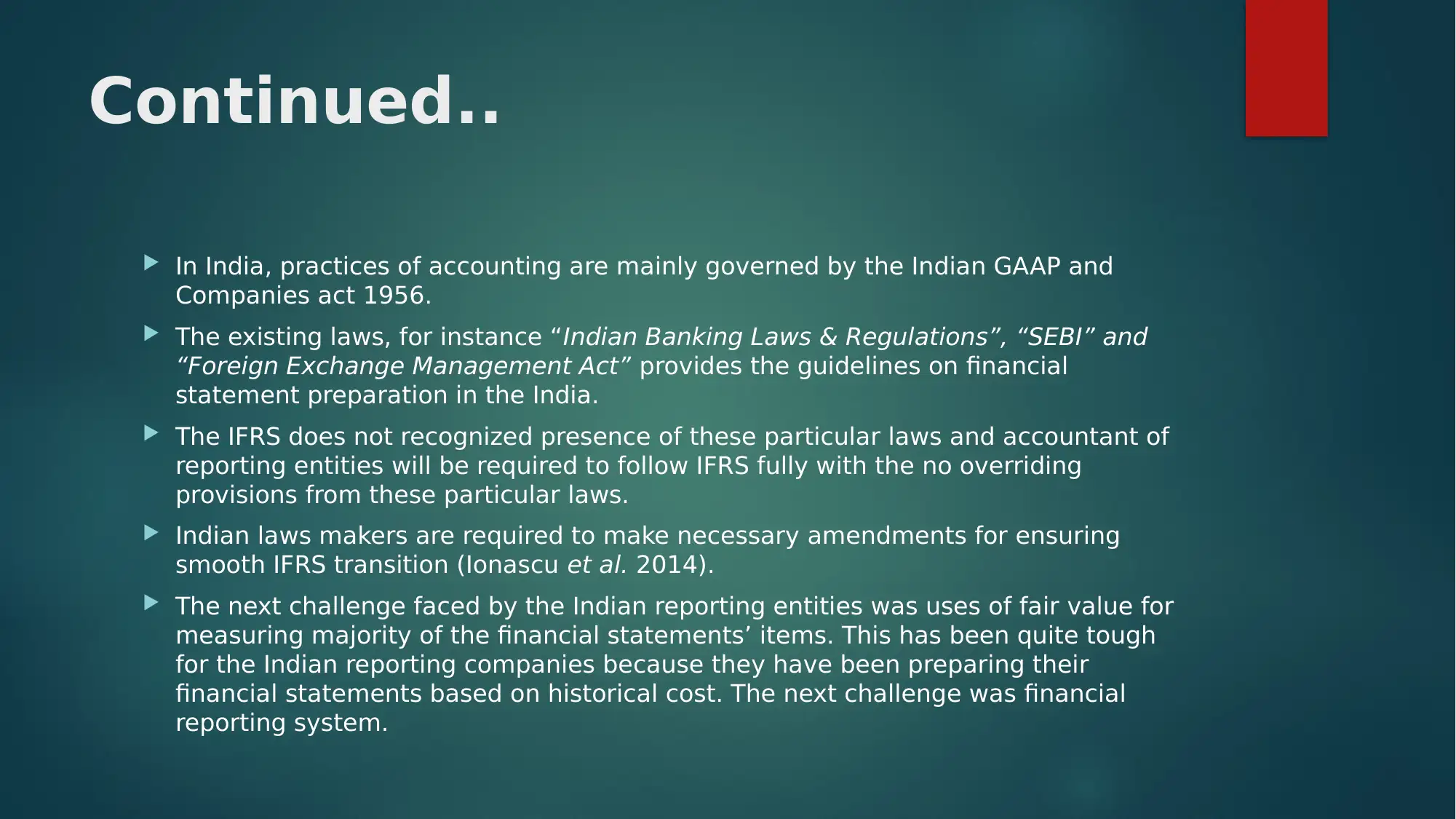
Continued..
In India, practices of accounting are mainly governed by the Indian GAAP and
Companies act 1956.
The existing laws, for instance “Indian Banking Laws & Regulations”, “SEBI” and
“Foreign Exchange Management Act” provides the guidelines on financial
statement preparation in the India.
The IFRS does not recognized presence of these particular laws and accountant of
reporting entities will be required to follow IFRS fully with the no overriding
provisions from these particular laws.
Indian laws makers are required to make necessary amendments for ensuring
smooth IFRS transition (Ionascu et al. 2014).
The next challenge faced by the Indian reporting entities was uses of fair value for
measuring majority of the financial statements’ items. This has been quite tough
for the Indian reporting companies because they have been preparing their
financial statements based on historical cost. The next challenge was financial
reporting system.
In India, practices of accounting are mainly governed by the Indian GAAP and
Companies act 1956.
The existing laws, for instance “Indian Banking Laws & Regulations”, “SEBI” and
“Foreign Exchange Management Act” provides the guidelines on financial
statement preparation in the India.
The IFRS does not recognized presence of these particular laws and accountant of
reporting entities will be required to follow IFRS fully with the no overriding
provisions from these particular laws.
Indian laws makers are required to make necessary amendments for ensuring
smooth IFRS transition (Ionascu et al. 2014).
The next challenge faced by the Indian reporting entities was uses of fair value for
measuring majority of the financial statements’ items. This has been quite tough
for the Indian reporting companies because they have been preparing their
financial statements based on historical cost. The next challenge was financial
reporting system.
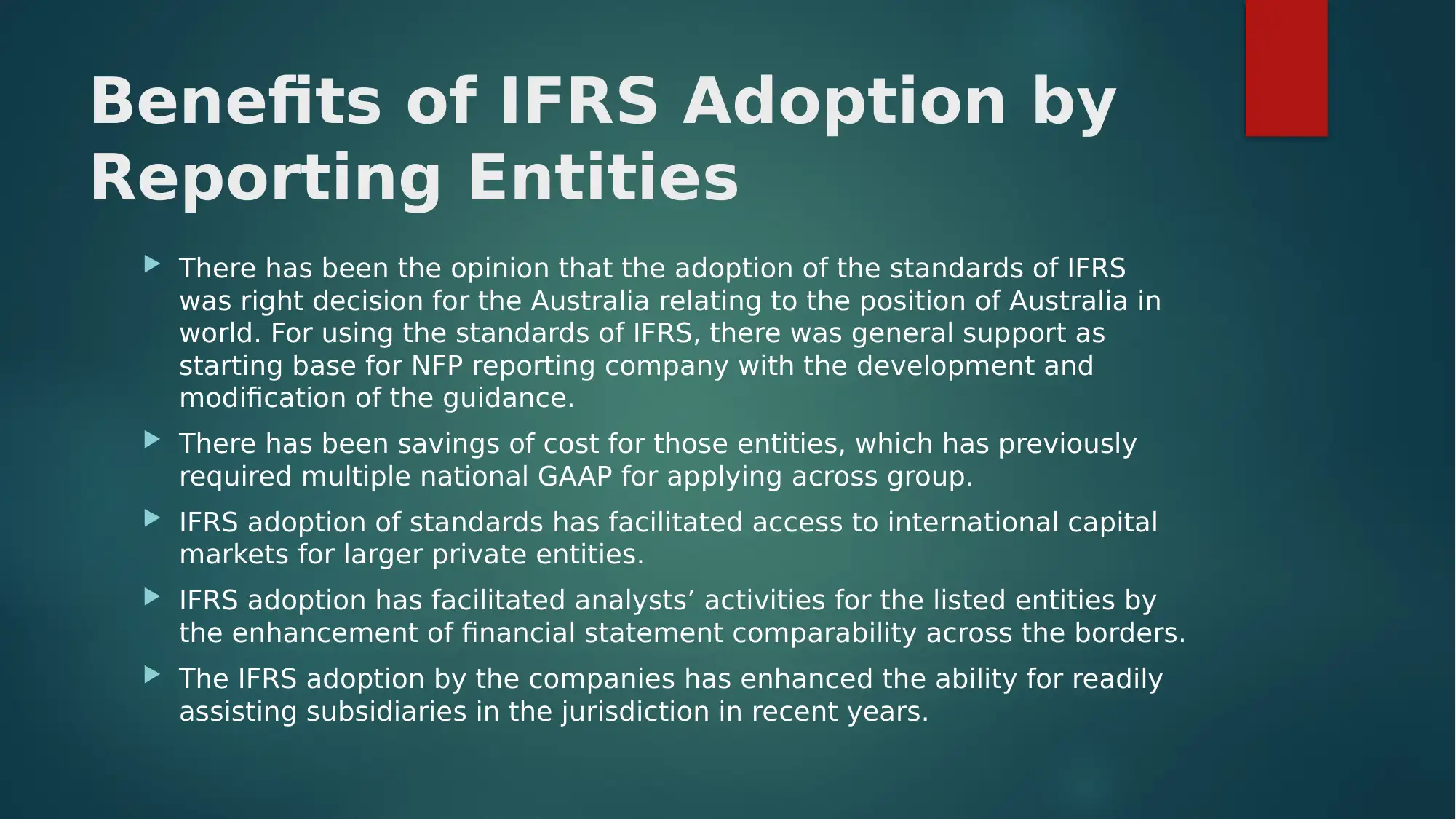
Benefits of IFRS Adoption by
Reporting Entities
There has been the opinion that the adoption of the standards of IFRS
was right decision for the Australia relating to the position of Australia in
world. For using the standards of IFRS, there was general support as
starting base for NFP reporting company with the development and
modification of the guidance.
There has been savings of cost for those entities, which has previously
required multiple national GAAP for applying across group.
IFRS adoption of standards has facilitated access to international capital
markets for larger private entities.
IFRS adoption has facilitated analysts’ activities for the listed entities by
the enhancement of financial statement comparability across the borders.
The IFRS adoption by the companies has enhanced the ability for readily
assisting subsidiaries in the jurisdiction in recent years.
Reporting Entities
There has been the opinion that the adoption of the standards of IFRS
was right decision for the Australia relating to the position of Australia in
world. For using the standards of IFRS, there was general support as
starting base for NFP reporting company with the development and
modification of the guidance.
There has been savings of cost for those entities, which has previously
required multiple national GAAP for applying across group.
IFRS adoption of standards has facilitated access to international capital
markets for larger private entities.
IFRS adoption has facilitated analysts’ activities for the listed entities by
the enhancement of financial statement comparability across the borders.
The IFRS adoption by the companies has enhanced the ability for readily
assisting subsidiaries in the jurisdiction in recent years.
⊘ This is a preview!⊘
Do you want full access?
Subscribe today to unlock all pages.

Trusted by 1+ million students worldwide
1 out of 21
Related Documents
Your All-in-One AI-Powered Toolkit for Academic Success.
+13062052269
info@desklib.com
Available 24*7 on WhatsApp / Email
![[object Object]](/_next/static/media/star-bottom.7253800d.svg)
Unlock your academic potential
Copyright © 2020–2026 A2Z Services. All Rights Reserved. Developed and managed by ZUCOL.





